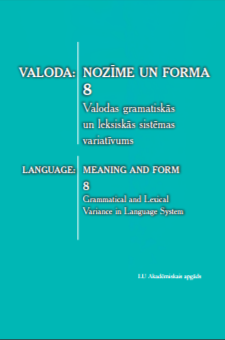Requests, questions and space: evidence from Estonian, Latvian, Lithuanian, Finnish and Russian
Requests, questions and space: evidence from Estonian, Latvian, Lithuanian, Finnish and Russian
Author(s): Renate Pajusalu , Birute Klaas-Lang, Karl PajusaluSubject(s): Eastern Slavic Languages, Baltic Languages
Published by: Latvijas Universitātes Akadēmiskais apgāds
Keywords: politeness; requests; questions; modality; conditional mood;
Summary/Abstract: This study is trying to answer the question of how does requesting differ in Estonian, Latvian, Lithuanian, Finnish and Russian. The data is elicited by written discourse completion tasks (DCT) in which native speakers of Estonian, Finnish, Latvian, Lithuanian and Russian were asked to complete the situations described by filling in appropriate requests or questions. Head acts of the sequences have been coded for relevant grammatical categories: syntactic type of the clause, morphological form of the verb (especially considering mood and tense), negation of the main verb, modal constructions and address form. In our data, the most typical head act of request in all studied languages is an interrogative clause containing a modal verb in the conditional mood. The aim of the study is to identify the main politeness strategies which are used in the studied languages to perform a question about location or request to move somewhere. Typical questions, however, have less conditional forms. In addition, in this article we compare these languages with respect to expressing motion events.
Journal: Valoda: nozīme un forma
- Issue Year: 2017
- Issue No: 8
- Page Range: 212-231
- Page Count: 20
- Language: English

